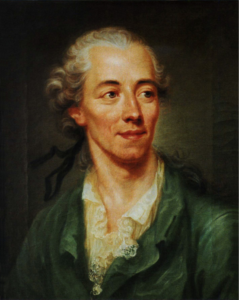At midnight
(Poet's title: In der Mitternacht)
Set by Schubert:
D 464
[August 1816]
Todesstille deckt das Tal
Bei des Mondes falbem Strahl!
Winde flüstern dumpf und bang
In des Wächters Nachtgesang.
Leiser, dumpfer tönt es hier
In der bangen Seele mir,
Nimmt den Strahl der Hoffnung fort,
Wie den Mond die Wolke dort.
Hüllt, ihr Wolken, hüllt den Schein
Immer tiefer, tiefer ein!
Vor ihm bergen will mein Herz
Seinen tiefen, tiefen Schmerz.
Nennen soll ihn nicht mein Mund:
Keine Träne mach ihn kund;
Senken soll man ihn hinab
Einst mit mir ins kühle Grab.
O der schönen langen Nacht,
Wo nicht Erdenliebe lacht,
Wo verlassne Treue nicht
Ihren Kranz von Dornen flicht!
An des Todes milder Hand
Geht der Weg ins Vaterland;
Dort ist Liebe sonder Pein;
Selig, selig werd ich sein.
A deathly silence is covering the valley
In the pale moonlight;
Winds are whispering, muffled and anxious,
In the watchman’s night song.
It resounds here, more gentle, more muffled,
In my anxious soul,
It takes away the ray of hope
As the cloud up there removes the moon.
Wrap it, clouds, wrap the glow
Up, ever deeper, deeper!
My heart wants to hide from it
Its deep, deep pain.
My mouth will not name it;
No tears will acknowledge it;
It should be buried
Along with me in the cool grave.
Oh, that beautiful long night
Where no earthly love laughs,
Where faithlessness does not
Construct a wreath of thorns!
In the gentle hand of death
The path leads into the fatherland;
There, there is love without agony;
I shall be happy, happy.
All translations into English that appear on this website, unless otherwise stated, are by Malcolm Wren. You are free to use them on condition that you acknowledge Malcolm Wren as the translator and schubertsong.uk as the source. Unless otherwise stated, the comments and essays that appear after the texts and translations are by Malcolm Wren and are © Copyright.
☙
Themes and images in this text:
Clouds Covers and covering Graves and burials Hands Hearts Hiding High, low and deep Hope Midnight Mouths Night and the moon Pain Paths Rays of light Soul Tears and crying Thorns and pricking Valleys Wind Wreaths and garlands
In many nocturnes moonlight offers some sort of balm or consolation. To begin with, we think that this poem is going to be similar. The valley is draped or covered with a deadly moonlit silence and we expect this to offer some calm to the agitated speaker. But no, when the cloud occludes the moon it becomes clear that the pale moonlight was just a metaphor for the ray of hope which his just been extinguished. The speaker wants to avoid any light being shed on his inner torment and is impatient for any remaining hope to be wrapped up and buried with him in a deep, deep grave.
He is not totally successful in hiding his agony, though. He lets slip what has precipitated his torment: ‘verlaßne Treue’ (abandoned fidelity / a breach of trust). Someone has not been faithful, and the result is a wreath of thorns. Moonlight cannot offer any treatment for the wounds inflicted. Death is the only way out.
☙
Original Spelling and note on the text In der Mitternacht Todesstille deckt das Thal Bey des Mondes falbem1 Strahl; Winde flistern, dumpf und bang, In des Wächters Nachtgesang. Leiser, dumpfer tönt es hier In der bangen Seele mir, Nimmt den Strahl der Hoffnung fort, Wie den Mond die Wolke dort. Hüllt, ihr Wolken, hüllt den Schein Immer tiefer, tiefer ein! Vor ihm bergen will mein Herz Seinen tiefen, tiefen Schmerz. Nennen soll ihn nicht mein Mund; Keine Thräne mach' ihn kund; Senken soll man ihn hinab Einst mit mir ins kühle Grab. O der schönen langen Nacht, Wo nicht Erden-Liebe lacht, Wo verlaßne Treue nicht Ihren Kranz von Dornen flicht! An des Todes milder Hand Geht der Weg ins Vaterland; Dort ist Liebe sonder Pein; Selig, selig werd' ich seyn. 1 Schubert changed 'halbem' (half) to 'falbem' (dun, pale)
Confirmed by Peter Rastl with Schubert’s source, Gedichte von Johann Georg Jacobi. Zweyter Theil. Wien, 1816. Bey Ch. Kaulfuß & C. Armbruster (Meisterwerke deutscher Dichter und Prosaisten. Siebenzehntes Bändchen), pages 112-113; and with J. G. JHacobi’s sämmtliche Werke. Dritter Band. Zweyte rechtmäßige, verbesserte und vermehrte Auflage. Zürich, bey Orell, Füßli und Compagnie. 1809, pages 245-246.
To see an early edition of the text, go to page 112 [120 von 254] here: http://digital.onb.ac.at/OnbViewer/viewer.faces?doc=ABO_%2BZ157693100


